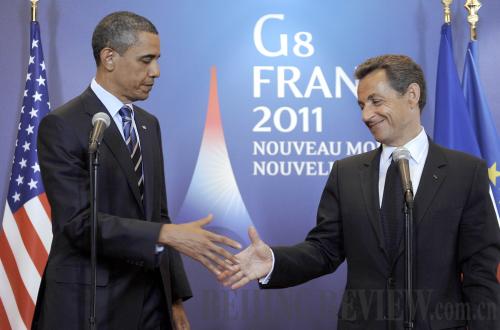|
 |
|
G8 PARTNERS: French President Nicolas Sarkozy meets U.S. President Barack Obama in Deauville on May 27 (XINHUA/AFP) |

The first meeting of the Group of Eight (G8) countries, then the G7, was convened by French President Valéry Giscard d'Estaing, in the 1970s. Four decades on, the world has changed massively. But the return of the G8 to the coast of northern France under the presidency of France is a moment to think about the function and future of the G8 in a world where more work is done via the G20 or other forums.
Challenges
For many in the G8, they are meeting at a time of internal and external challenges. President Nicolas Sarkozy of France is facing re-election next year. The man who was likeliest to be his chief opponent in next year's elections, Dominique Strauss-Kahn, is now on bail in New York awaiting trial on sexual assault charges. Even so, Sarkozy is suffering from historic lows in the opinion polls.
U.S. President Barack Obama is also up for re-election in 2012. His chances have been enhanced by the recent death of Osama Bin Laden. Even so, continuing unemployment and the huge problems of dealing with government expenditure mean that, as one commentator said, it will be the price of food and petrol, not the death of the world's most wanted terrorist, that secures his second term in the White House.
In Italy, Prime Minister Silvio Berlusconi remains embroiled in legal problems. Japan is just emerging from the devastating combination of a massive tsunami that killed thousands of people and the immense challenges of the Fukushima nuclear disaster.
Even Germany, with its relatively strong growth rate in the last few months, remains distracted by continuing crises in the euro zone. Greece's problems have shown the real possibility of growing deeper in coming weeks, with further IMF and EU intervention.
Symbolically, Sarkozy in his statement at the G8 Summit referred to his "excellent meeting" with Russian President Dmitry Medvedev. One of the most exciting announcements during the meeting was the urge to conclude talks for Russia's entry into the WTO by the end of 2011.
Focuses
The declaration issued at the close of the summit referred to a raft of issues on which G8 leaders agreed. Some of these were expressions of mutual support. Japan's tragic recent events were accorded special attention, with the full support of the other states in helping it rebuild its economy and damaged infrastructure, and address its immense nuclear issues.
France looks on this with particular engagement, because so much of its energy also comes from nuclear power. Germany was much more opposed, with Chancellor Angela Merkel halting further development of nuclear power station building soon after the crisis in Japan began.
The focus on nuclear energy and safety—unsurprisingly—took up a whole annex of the final declaration, connected to the 25th anniversary of the massive nuclear accident in Chernobyl and ongoing support for dealing with this. This acted as reminder that nuclear power, when it goes wrong, has an impact decades afterwards.
G8 leaders were able to mark an improvement in their economic positions since the time they last met. But the challenges of returning to anything resembling a full recovery remain, with job creation a particular concern. The UK's ruling coalition government, in particular, during Obama's visit to London just before the G8 Summit, were seeking his support for their deep cuts to government spending in order to address a 12-percent deficit.
| 